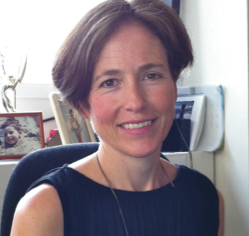
Mills College is honored that Holly Gordon will be speaking at Commencement this year. She is one of the executive producers of the documentary film “Girl Rising” and the executive director of 10×10 Fund for Girls Education, a global campaign dedicated to the empowerment of girls. After a groundswell of communities and individuals expressed interest in viewing the film, Regal Cinemas picked up the documentary in April for national release. The film follows nine girls from nine countries to demonstrate that everyone benefits when we educate girls. Holly Gordon spoke with The Campanil to reflect on her own education and how the film been received globally.
The Campanil: Your career has been pretty dynamic, with many years at ABC, different responsibilities at the Tribeca Film Festival. Looking at your history it seems like you’re constantly shifting gears. Was that something you sought out?
Holly Gordon: In all my jobs and throughout my career I have sought new opportunities that feel like a roller coaster, a little dangerous, like I might be a little out of control, but with that you know you’re learning new skills. You’ve been educated in a completely different environment than I. There was no email when I graduated from college. In today’s world being able to be dynamic with your mind, being able to learn things quickly and adapt your skills to the needs of the environment around you are really important because organizations are more global. My team is all over the map but we’re working on a project that takes a ton of organization, it doesn’t matter where we are. Being able to be flexible with your career and looking for opportunities as opposed to waiting for them to present themselves is really important in today’s world.
TC: What are some of your favorite reactions “Girl Rising?”
HG: [A screening at a high school in Malawi, when the students were asked to write essays in reaction] a young boy said, “I have seen my mother and the role that she plays in my life in a totally different way because she has an education and I see how important that’s been to my family and my progress and the fact that I’m in school. So, of course girls should go to school so that they too have mothers like mine who could help to earn a living.” It was so intense. It was this recognition not just of the progress in their own communities, but the progress that could happen with that sense of individual leadership. That they, these kids in Malawi had a role to play in global leadership. And that’s exactly the same responses that were getting, you know, in a school in Denver or outside L.A. That young people really see this film and say, “Okay, I’m beginning my life and I can make a difference here.”
TC: You graduated with a BA in International Relations from Brown, how did visual storytelling become the main focus of your career?
HG: I realized that I thought the best application of my fascination with the world and my desire to be involved with international politics and diplomacy was actually to go into the news business. I saw the evening news as the most powerful tool to tell the most important stories around the world and I thought visual storytelling was the most powerful way to do that. I fundamentally believe in the power of video and film making to be a drive of social change. This whole project grew out of the sense that traditional journalism channels were failing. In the old days it was all about exclusivity. “How can I get the most viewers to my one night exclusive with, like OJ Simpson?” and then everyone reruns that cut. That doesn’t happen anymore. Now it’s about ubiquity: “How can I get my interview on as many channels as possible?”
TC: What was your favorite part of college?
HG: I’m so not a geek, you’ll see that I’m not a geek but my favorite thing about being in college was I really love to learn, that’s the other reason I became a journalist. College is this wonderful time in your life when you’re basically there to learn and to have interesting conversations with your friends. Actually, some of my most interesting conversations happened when I was at college late at night in my room or in our apartment trying to figure out the world and your place in it. It’s a really amazing time. There’s only one time in my life that I would probably want to go back to and do again and that would be college.
TC: What was your least favorite part of college?
HG: I didn’t spend enough time going to parties.
Watch the trailer to Holly Gordon’s documentary “Girl Rising” here:

